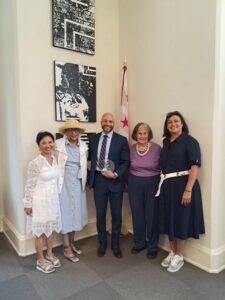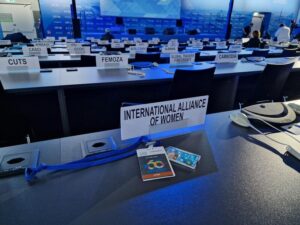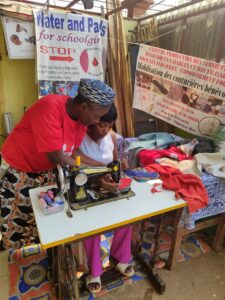From a Girl to a Doctor - a Real Career in ICT

On April 27, “Girls in ICT Day,” the United Nations International Telecommunication Union (ITU) and partners will highlight the need to promote technology career opportunities for girls to become both Information, Communications and Technologies (ICT) users and creators in the digital world. This year’s theme is “Digital Skills for Life.” It continues the UN International Women’s Day theme “DigitALL: Innovation and technology for gender equality” and the Global Digital Compact’s focus on open, free, and secure digital spaces for women and girls.
Encourage girls and young women to pursue STEM education.
Reflecting as a technologist and developer of STEM programming for girls, the decision to pursue an ICT career provided me an opportunity to develop solutions in diverse fields from environmental remote sensing to biomedicine.
In developing STEM education programming, a combination of foundational skills helps girls succeed in digital spaces. Presenting them with diverse career options, and integrating life skills, empowerment, and competence-based training work together to ensure they have the tools to solve serious problems confronting their communities while moving closer to achieving sustainable development goals.
One memorable example is from my engagement with African women role models at a Rwanda eskills4gilrls meetup. These role models in ICT shared the power of learning to code as an entry into IT entrepreneurship. Once they learned to code, they could envision new ideas, design their websites, and compete with men to market their capabilities. Role model Carolyn Ekyarisiima stated, “Coding is a superpower. Once that girl has that superpower she is like a mighty sword for her family.” Role model Grace Ouendo stated, “I think coding is good for her because it is all about bringing solutions to where there are no solutions in the technology world.” Role model Ernestina Appiah stated, “Even if you don’t choose it as a career, you will need the skills that come with coding like critical thinking and the ability to collaborate.”
Inspire girls and young women to work in STEM careers.
In my career, I did not have the benefit of regular one-on-one sessions with a mentor or role model who was an expert in my field. I often struggled with isolation being the only woman of color on a team of white males. This is an even more critical situation for girls in developing countries who experience limited access to affordable internet, mentoring, and role models.
As a role model and board member for Career Girls, I understand that it’s fundamental for girls to see role models to “close the imagination gap.” As the largest online database of role models, Career Girls brings together over 800+ accomplished women working in cities across the United States and countries around the world, including Rwanda, Tanzania, Ethiopia, and Japan. Through a series of videos, each role model shares the story of her career journey in their own words and through an easily accessible format. What skills from her childhood does she still rely on today? What is a typical day like in her career? What obstacles has she overcome? Our role models answer these questions and many others to provide an engaging and comprehensive look at wide-ranging careers. We choose women at the top of their field, providing real-world experience and helping girls envision different possibilities for a career they often associate with males while reinforcing messages of positive self-esteem and self-worth.
Engage the community and promote collaborations through partnerships.
The COVID-19 pandemic highlighted the link between the digital divide and academic achievement gaps for girls by forcing many school districts to move from in-person to remote schooling. Virtual education grew in popularity. In particular, STEM camps for girls, where tech companies partnered with NGOs, provided live, hands-on online instruction experiences and access to role models.
Career Girls virtual camps are a shining example of a successful collaboration opportunity between NGOs and the private sector. For three years in a row, the Career Girls Artificial Intelligence, Machine Learning and Robotics camp has been sponsored by Toyota Research Institute (TRI), which granted girls free registration, access to world-class women researchers in these fields, and their very own robot to engage with and learn from. The girls could program their robot to walk, use its arms, and even avoid obstacles intelligently through coding.
The outcome? A staggering 92.5% of the girls shared a likelihood of pursuing a career in STEM. In addition, campers reported an increase in their understanding of the steps they will need to take to achieve their career goals, the education and skills needed for their favorite career, and how doing well in school now will help them achieve their dreams.
We must equip girls with the knowledge and tools to make advances in ICT technology so that the outcomes of applying these solutions have a positive impact on their future. That means not just having access to digital skills but also having a seat at the table to decide critical policy issues on the use of these powerful technologies.
Dr. Beverly Thompson
Senior Scientist in the Artificial Intelligence and Machine Learning Accelerator
Member of Commission on Digital Divide
The picture on top of the page shows Dr. Beverly Thompson giving a presentation to Dr. Lee Schwartz, Geographer of the Department of State and the Director of Office of the Geographer and Global Issues. The topic was using satellite imagery to help reach nomadic settlements in the Lake Chad Basin to support vaccination campaigns.



